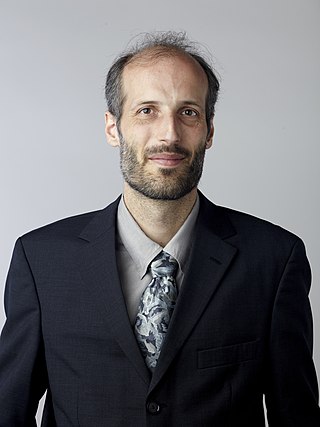Related Research Articles

Sir Michael Victor Berry, is a British mathematical physicist at the University of Bristol, England.

Professor Anneila Isabel Sargent FRSE DSc is a Scottish–American astronomer who specializes in star formation.
Eric Ronald Priest is Emeritus Professor at St Andrews University, where he previously held the Gregory Chair of Mathematics and a Bishop Wardlaw Professorship.

Leroy "Lee" CroninFRSE FRSC is the Regius Chair of Chemistry in the School of Chemistry at the University of Glasgow. He was elected to the Fellowship of the Royal Society of Edinburgh, the Royal Society of Chemistry, and appointed to the Regius Chair of Chemistry in 2013. He was previously the Gardiner Chair, appointed April 2009.
Henry Keith Moffatt, FRS FRSE is a British mathematician with research interests in the field of fluid dynamics, particularly magnetohydrodynamics and the theory of turbulence. He was Professor of Mathematical Physics at the University of Cambridge from 1980 to 2002.
Dirk ter Haar FRSE FIP DSc was an Anglo-Dutch physicist.

Sir Martin Hairer is an Austrian-British mathematician working in the field of stochastic analysis, in particular stochastic partial differential equations. He is Professor of Mathematics at EPFL and at Imperial College London. He previously held appointments at the University of Warwick and the Courant Institute of New York University. In 2014 he was awarded the Fields Medal, one of the highest honours a mathematician can achieve. In 2020 he won the 2021 Breakthrough Prize in Mathematics.
Douglas Owen Gough FRS is a British astronomer, Professor Emeritus of Theoretical Astrophysics in the University of Cambridge, and Leverhulme Emeritus Fellow.

Jason Meredith Reese (24 June 1967 – 8 March 2019 was a British engineering scientist, and Regius Professor of Engineering at the University of Edinburgh.
Katherine Jane Hawley (1971-2021) was a British philosopher specialising in metaphysics, epistemology, ethics, and philosophy of physics. Hawley was a professor of philosophy at the University of St Andrews. She was the author of How Things Persist, Trust: a Very Short Introduction, and How To Be Trustworthy. Hawley was elected a Fellow of Royal Society of Edinburgh in 2016, elected a Fellow of the British Academy in 2020, and she was the recipient of a Philip Leverhulme Prize (2003) and a Leverhulme Major Research Fellowship (2014–16).
Andrew Collier Cameron is a British astronomer specialising in the discovery and characterisation of exoplanets. He is a founding co-investigator of the WASP project and served as the head of the School of Physics and Astronomy of the University of St Andrews between 2012 and 2015 where he is currently a professor.

Sheila Rowan is a Scottish physicist and academic, who is Professor of Physics and Astronomy at the University of Glasgow in Scotland, and director of its Institute for Gravitational Research since 2009. She is known for her work in advancing the detection of gravitation waves. In 2016, Rowan was appointed the (part-time) Chief Scientific Advisor to the Scottish Government.

Hiranya Vajramani Peiris is a British astrophysicist at the University of Cambridge, where she holds the Professorship of Astrophysics (1909). She is best known for her work on the cosmic microwave background radiation, and interdisciplinary links between cosmology and high-energy physics. She was one of 27 scientists who received the Breakthrough Prize in Fundamental Physics in 2018 for their "detailed maps of the early universe."
Moira Mary Jardine is a British astrophysicist with an interest in young stars, particularly the structure of their magnetic fields and coronae, and the mechanisms by which they interact with their disks and planets. She was promoted to a Personal Chair in 2012, making her the first female professor of Physics at the University of St Andrews.
Kathryn Margaret Rudy is a manuscript historian at the University of St Andrews, Scotland. She is best known for her forensic approach to medieval books, and has pioneered the use of the densitometer to measure the grime that original readers deposited in their books. Her research focuses on the medieval reception of manuscripts, how they were manipulated and handled, and how book-making skills were lost with the advent of the printing industry.
Philippa K. Browning is a Professor of Astrophysics in the Jodrell Bank Centre for Astrophysics at the University of Manchester. She specialises in the mathematical modelling of fusion plasmas.
Lyndsay Fletcher is a Scottish astrophysicist at the University of Glasgow who specialises in solar flares.
Heather A. Harrington is an applied mathematician interested in applied algebra and geometry, dynamical systems, chemical reaction network theory, topological data analysis, and systems biology. Since 2020, she is professor of mathematics and Royal Society University Research Fellow at the Mathematical Institute, University of Oxford, where she heads the Algebraic Systems Biology group. In 2023, she became a director at the Max Planck Institute of Molecular Cell Biology and Genetics, where she is also leading the interinstitutional Center for Systems Biology Dresden (CSBD) together with partners from the Technical University Dresden and the Max Planck Institute for the Physics of Complex Systems.
Professor Mercedes Maroto-ValerFRSE FRSCFIChemEFRSA FEI is Champion and Director of the UK Industrial Decarbonisation Research and Innovation Centre (IDRIC) focused on accelerating the transition to net zero of the UK largest industrial clusters and establishing the first world net-zero industrial cluster. Maroto-Valer is Deputy Principal at Heriot-Watt University, leading institutional and global changes in sustainability, making an impact on achieving the United Nations Sustainable Development Goals and working with partners to achieve global carbon reduction targets. She is also director of the Research Centre for Carbon Solutions (RCCS) at Heriot-Watt University, where she holds the Robert Buchan Chair in Sustainable Energy Engineering. RCCS that is a multidisciplinary centre delivering innovation for the wider deployment of low-carbon energy systems required for meeting net-zero targets. Her track record covers energy systems, CCUS carbon dioxide capture and storage, integration of hydrogen technologies and low carbon fuels. Her work has been recognised through various awards and prizes, including the Philip Leverhulme Prize for Engineering in 2009.
Clare Elizabeth Parnell is a British astrophysicist and applied mathematician who studies the mathematics of the Sun and of magnetic fields, including the Solar corona and the Sun's magnetic carpet, magnetic reconnection in plasma, and the null points of magnetic fields. She is a professor of mathematics at the University of St Andrews, and the former head of the Division of Applied Mathematics at St Andrews.
References
- 1 2 Ineke De Moortel, University of St Andrews , retrieved 14 February 2018
- ↑ Female Presidents for Three Maths Societies, Institute of Mathematics and its Applications, 5 January 2018, retrieved 14 February 2018
- 1 2 Professor Ineke De Moortel FRSE, Royal Society of Edinburgh , retrieved 14 February 2018
- 1 2 3 Curriculum vitae (PDF), 30 August 2017, retrieved 14 February 2018
- ↑ "Prof. Ineke De Moortel". Editorial Boards & Team. Royal Astronomical Society . Retrieved 6 January 2022.
- ↑ "About the St Andrews Prize". st-andrews.ac.uk. University of St Andrews. Retrieved 4 March 2023.
- ↑ Philip Leverhulme Prize Winners 2009 (PDF), The Leverhulme Trust, archived from the original (PDF) on 15 February 2018, retrieved 14 February 2018